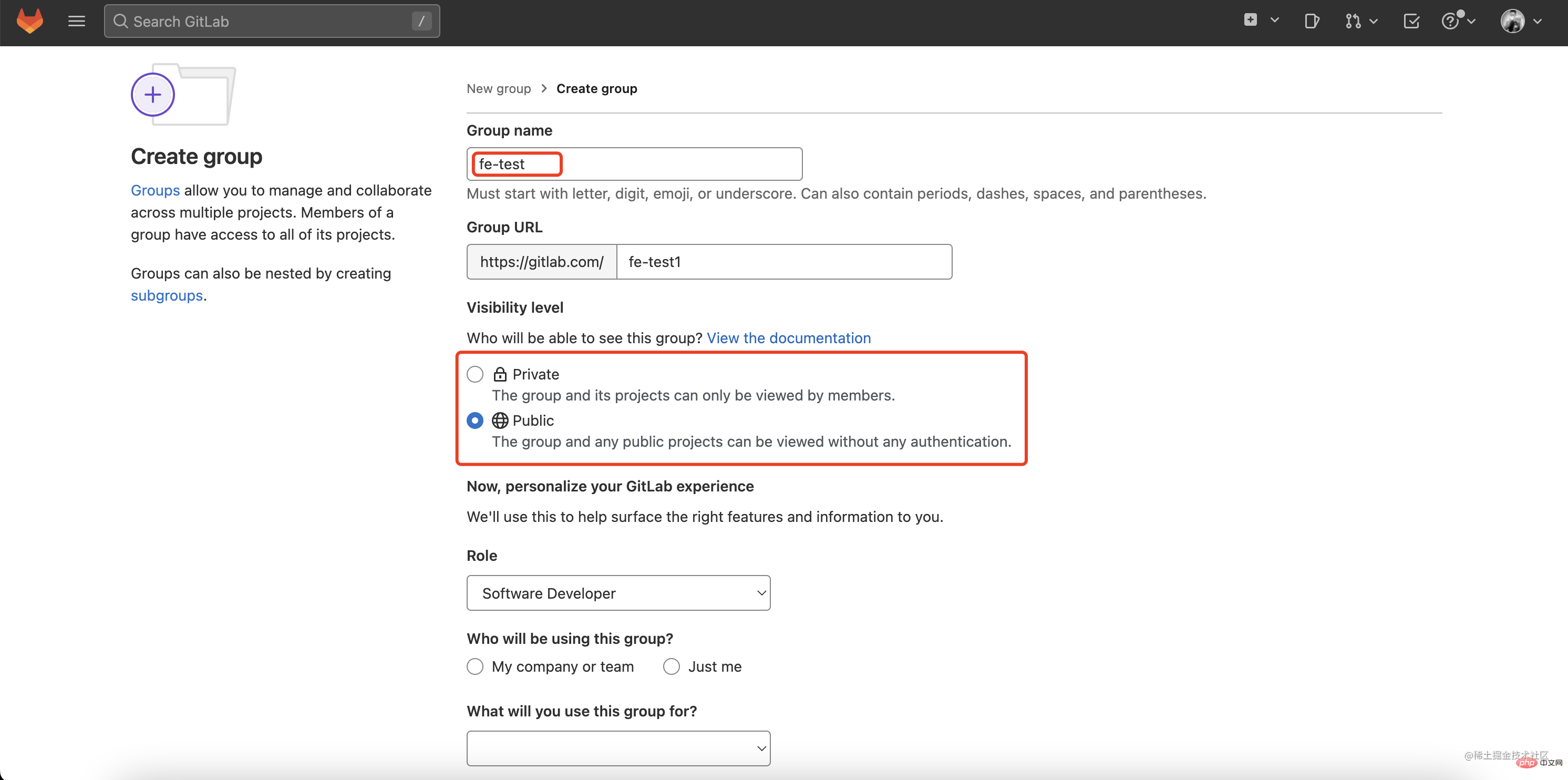 Development Tools
Development Tools
 git
git
 Detailed explanation of how companies register Gitlab and create projects
Detailed explanation of how companies register Gitlab and create projects
Detailed explanation of how companies register Gitlab and create projects
How to register Gitlab in an enterprise? How to create a company project? The following article will introduce to you how to register Gitlab and create a company project. I hope it will be helpful to you!
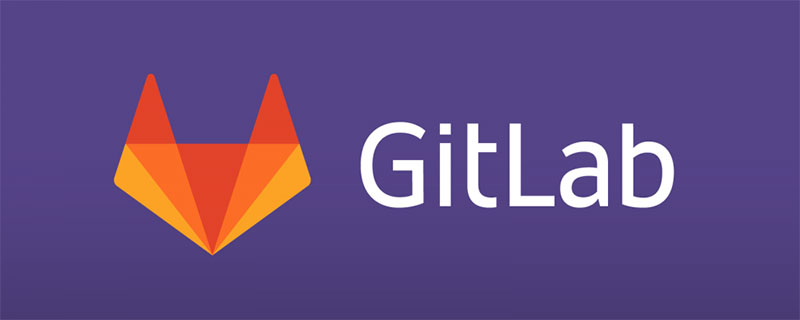
Login
Generally, the gitlab of an enterprise is private, that is, it is deployed on the enterprise's private server and cannot be accessed from the external network. , such as icode.xiumubai.com/, when you join the company, the company will open a corporate email for you, and you can use this email to log in to the corporate gitlab.
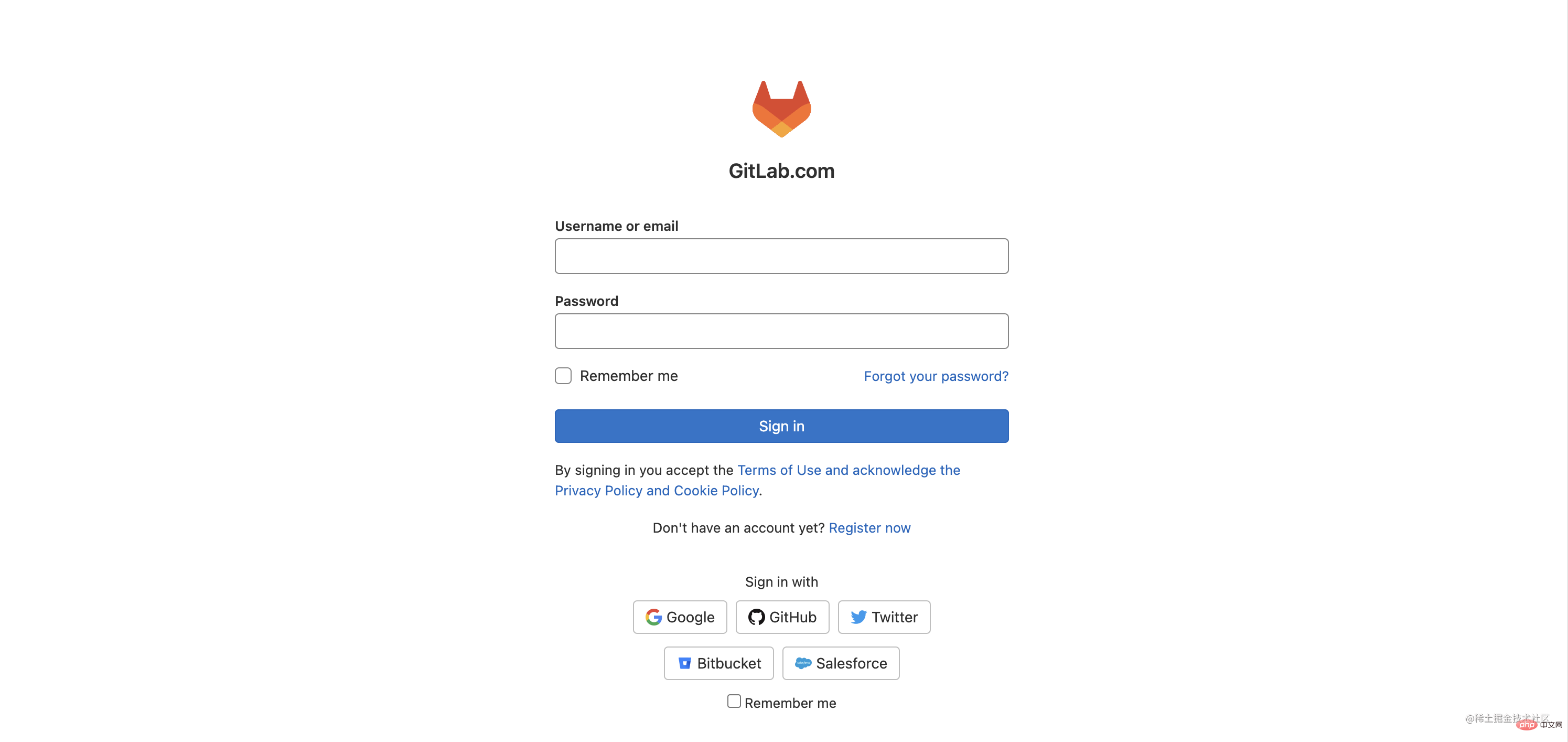
Of course, individuals can also register their own gitlab account. You can visit Gitlab registration link to register.
Now that we have successfully entered the Gitlab panel, the two most common ones are our Group and Project.
Group is a group, which contains many projects. Your leader will invite you to the group where your project is located.

Project is a project, and your Leader will give you the permission to operate the Project. If your level is not very high, you may only have permission to submit code.

Generate SSH KEY
After taking over the project, we need to clone to the local area and modify the code as needed pushCome to the remote warehouse. At this time, you need to grant permissions to the local operation so that we can submit the local code to the remote warehouse. This time involves the configuration of ssh key , the following are the steps.
1. Set user name and user email
Open your terminal and enter the following two lines of commands
git config --global user.name "xiumubai" git config --global user.email "xiumubai@qq.com"
Command explanation: The first line is to configure the user name, and the second line is to configure the email address. After the configuration is successful, use git config --list to view the user

This means the configuration is successful
Generatessh key
Enter the commandssh-keygen -t rsa -C 'Mailbox', just press Enter all the way.

id_rsa and id_rsa.pub## will be generated under the ~/.ssh folder. #Execute the following command to enter ssh, and then open the
file. The content of this file is the ssh key<div class="code" style="position:relative; padding:0px; margin:0px;"><pre class='brush:php;toolbar:false;'>cd ~/.ssh
cat id_rsa.pub</pre><div class="contentsignin">Copy after login</div></div>## we need to configure. <p><img src="/static/imghw/default1.png" data-src="https://img.php.cn/upload/article/000/000/024/aef491ee8d38049ad3d3bf3ff9f766db-5.png" class="lazy" alt="" loading="lazy">#Configuration</p>ssh key<h2 data-id="heading-4">
<strong><code>Return to the github panel, click on my avatar, and then select
edit profile
After opening, there is 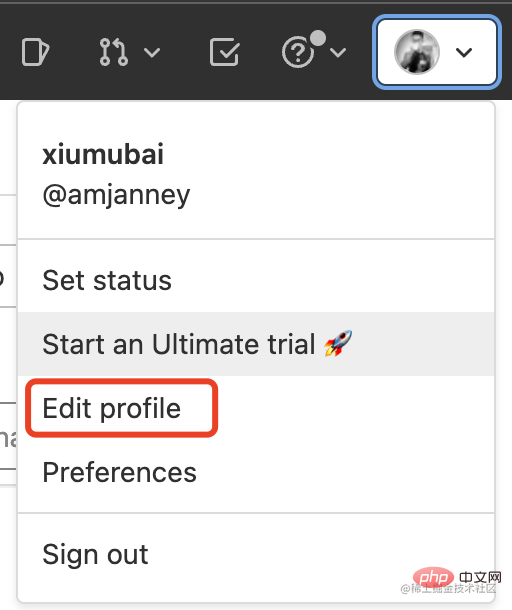 SSH Keys
SSH Keys
in the input box The content of id_rsa.pub, enter a title, click Add key
After the addition is successful, You can see the added ssh key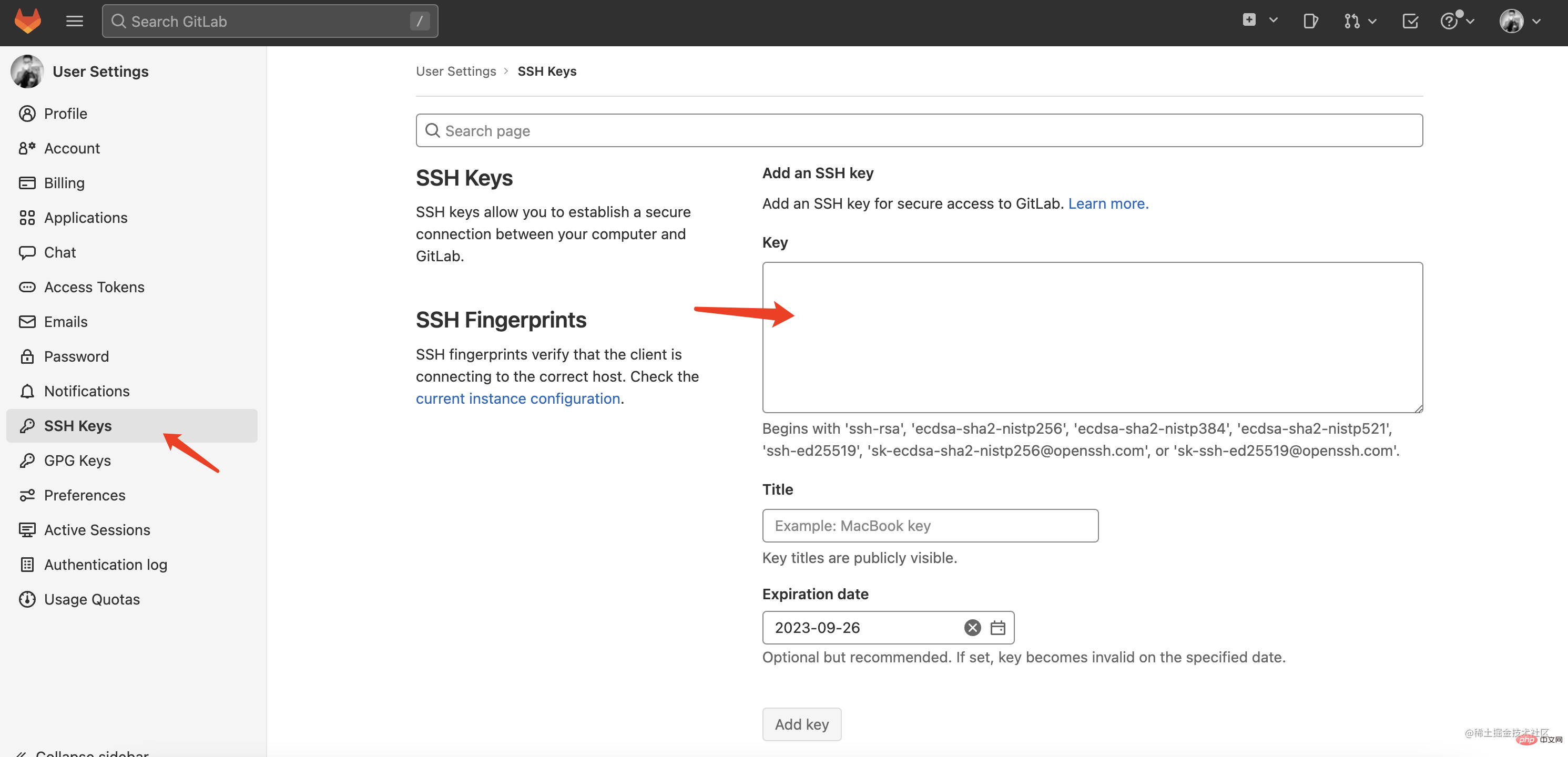
Next we can submit our code locally to the remote warehouse.
If it is in an enterprise, generally the groups and projects have been created. We just  clone
clone
Create a group
If you don’t have any groups or projects before, your panel will be very clean
Click Create a group to create a group, enter a personalized name, because duplicate names will be detected here, and then click Create a group at the end to create. Pay attention to the permission control here. Private is a private warehouse, which can only be viewed by those with permission, while Public is accessible to everyone.
Create project
Next we create a Project,

Click New project to create a project. Here we select a blank project
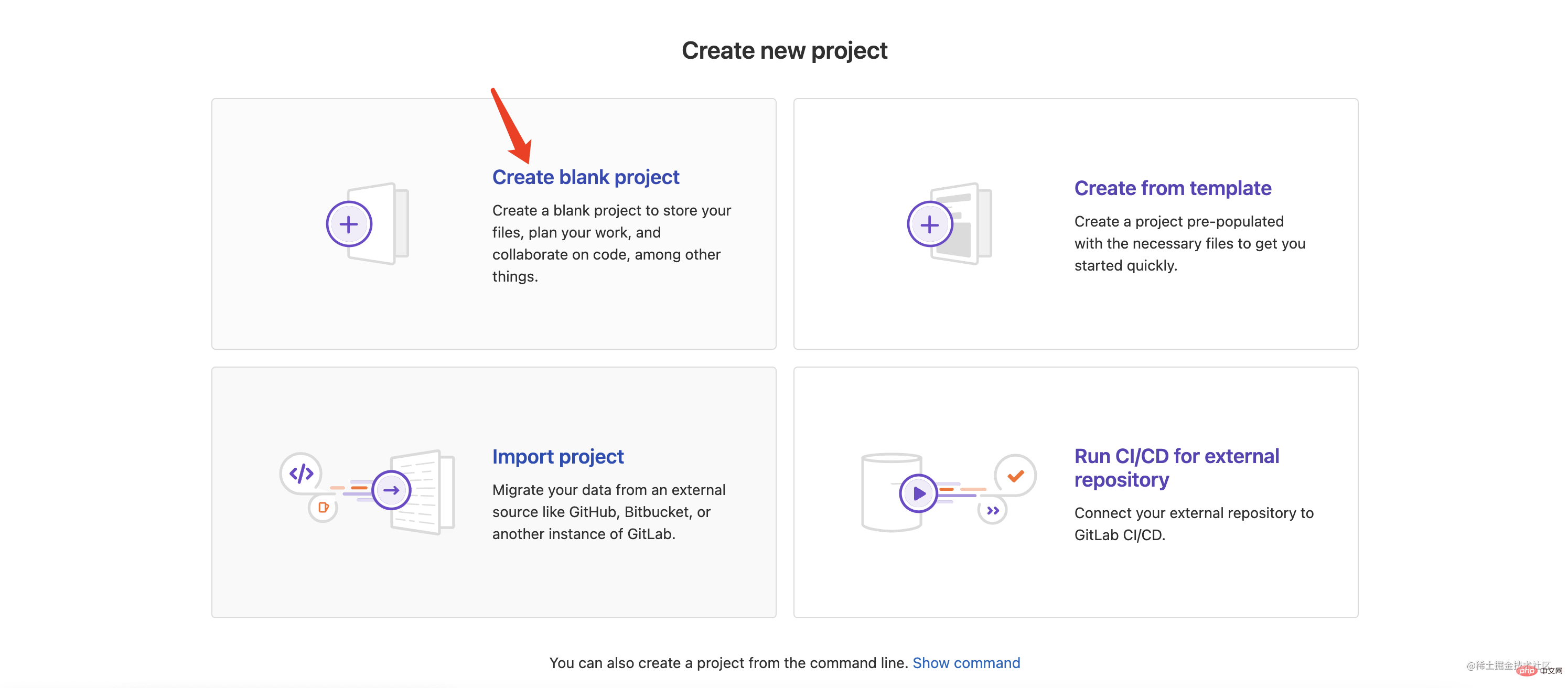
Give the project a name and select Permissions are selected according to your own needs. Generally, in enterprises, you select Private and initialize a REAME.md file. Click Create Project
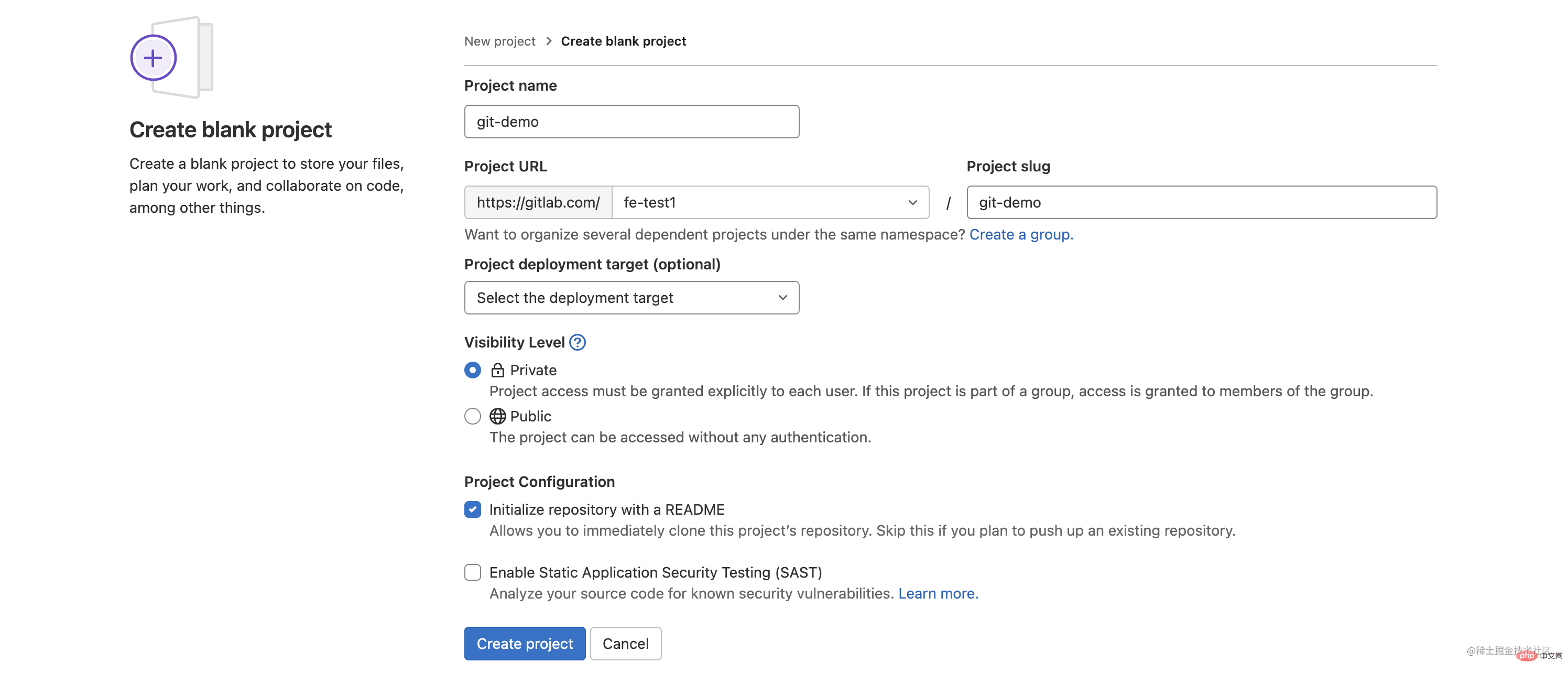
Project created successfully
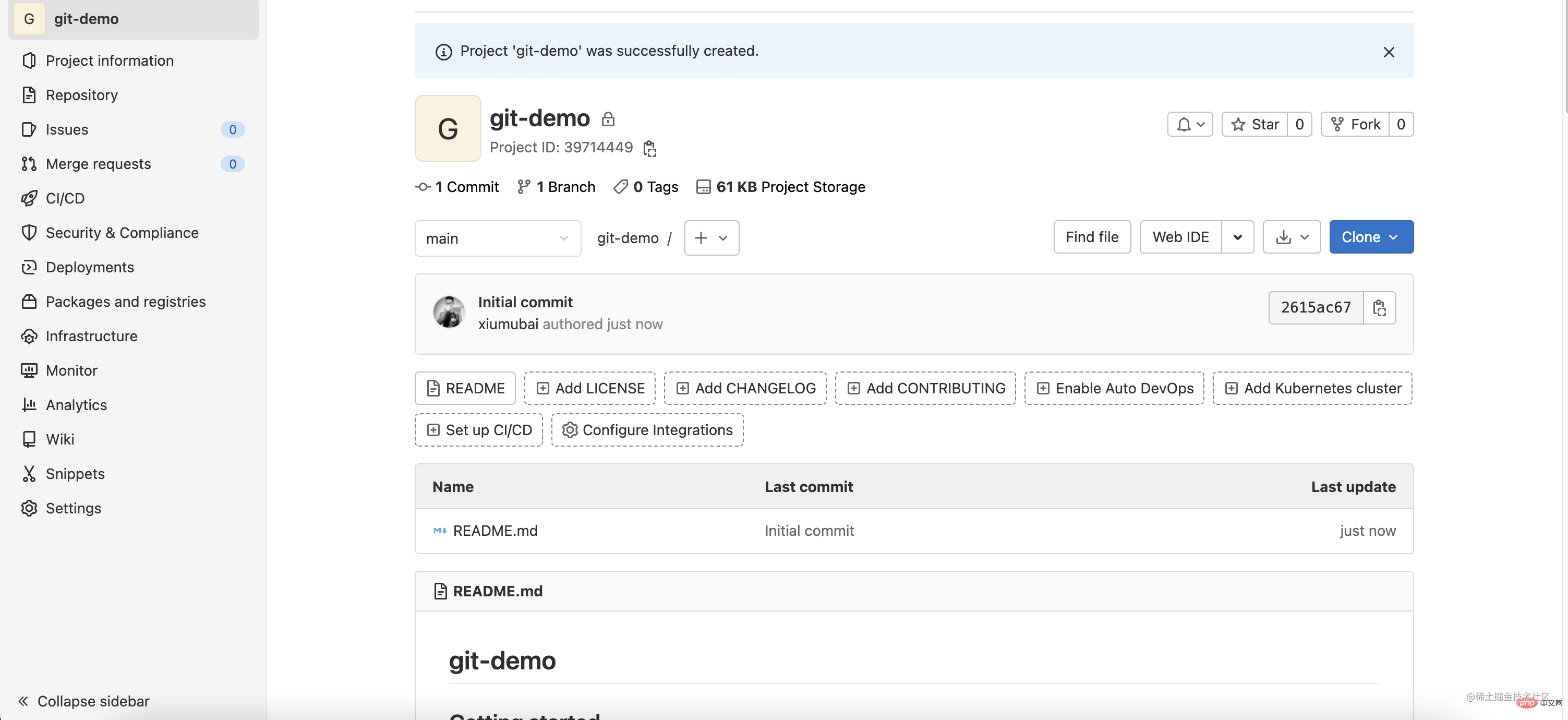
Add developer & permissions
Next we add developers to the project. This operation is also the work of the leaders in the company. If you have just entered the company and are at a relatively low level, you do not have this permission to operate.
In Porject information, select Members
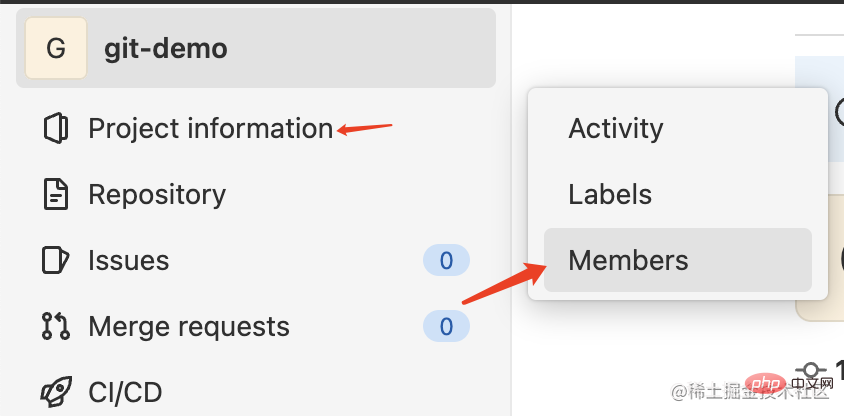
After entering the page, click in the upper right corner invite members
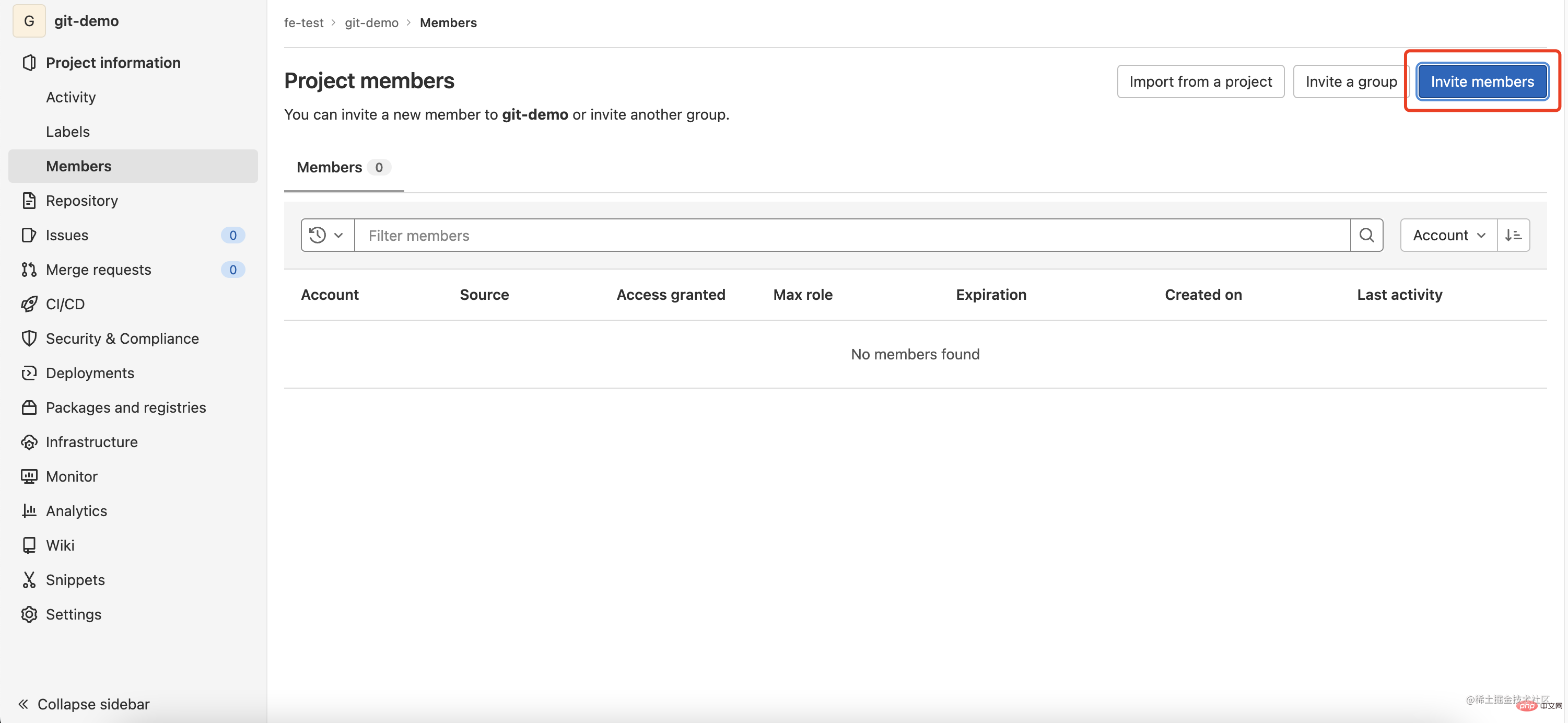
In the pop-up window, search for members
based on username or email. Among them, role role identities are The following differences:
- Guest: Guest role: This role can create issues and make comments in the project but cannot view or modify the GitLab project code.
- Reporter: Tester of the GitLab project: This role has additional permissions to view and clone the code of the Gitlab project based on the Guest role permissions, but cannot submit the project code, that is, it can only be viewed but not change.
- Developer: Project developer of GitLab project: This role can clone, develop, and submit project code.
- Maintainer: GitLab project administrator: This role can create projects, add tags, protect branches, add project members, and edit projects. The core RD leader can grant this authority.
- Owner: The Git system administrator is Administrator: This role has supreme authority. The development team leader can grant this permission.
Finally select an expiration time, which is chosen based on the actual situation
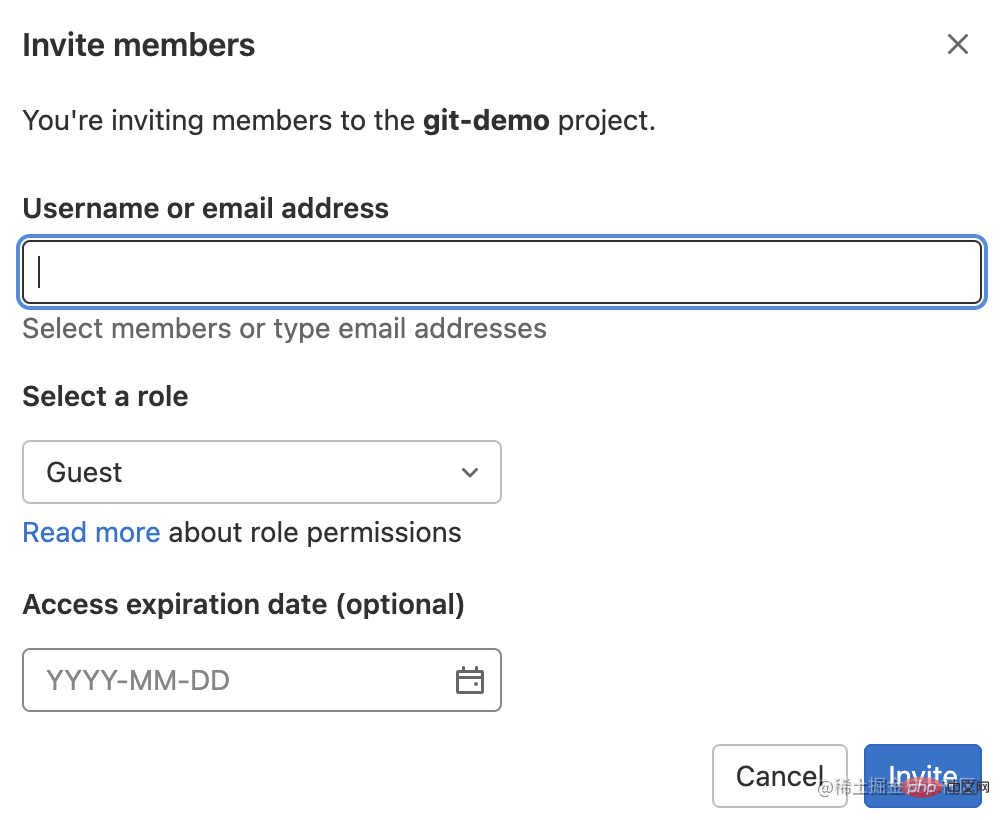
After setting it, click Invite to add it .
After the addition is successful, you can see the member you just invited in the list. You can set his permissions here or remove him. It is very convenient to manage each developer in the project.
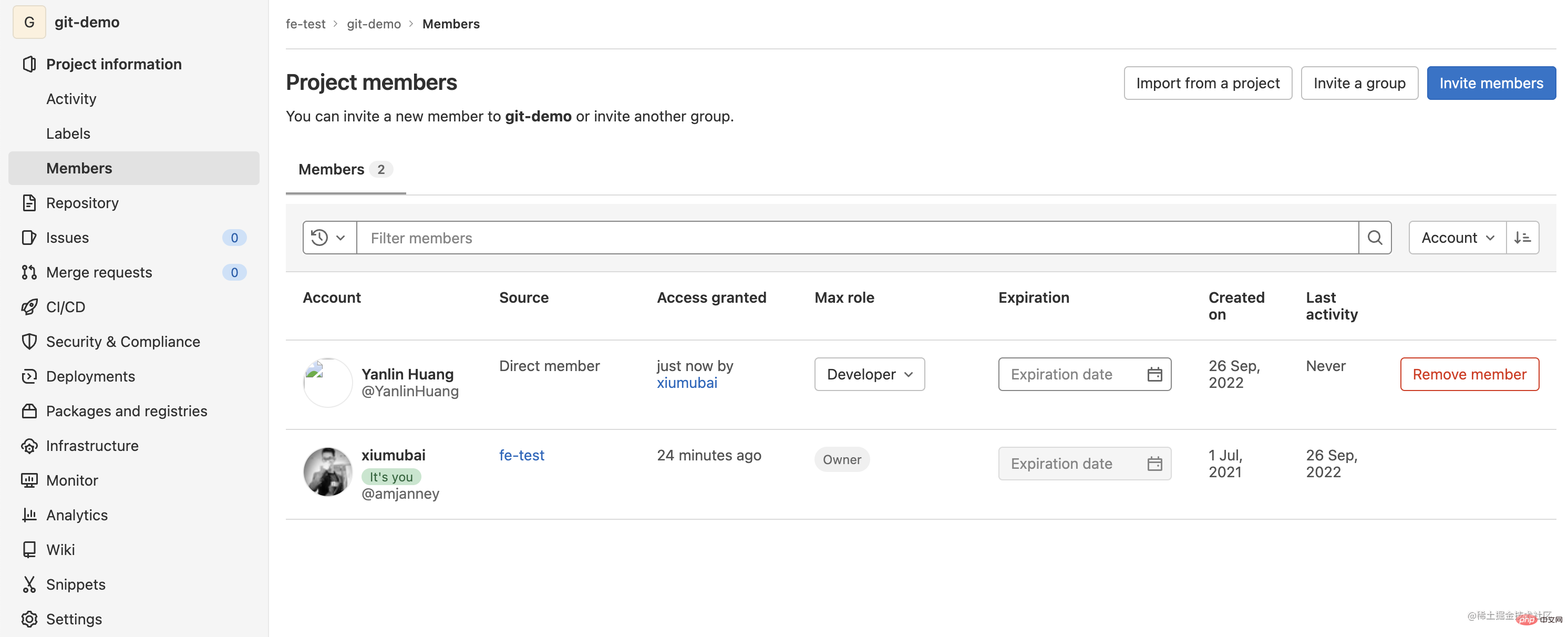
(Learning video sharing: Basic Programming Video)
The above is the detailed content of Detailed explanation of how companies register Gitlab and create projects. For more information, please follow other related articles on the PHP Chinese website!

Hot AI Tools

Undresser.AI Undress
AI-powered app for creating realistic nude photos

AI Clothes Remover
Online AI tool for removing clothes from photos.

Undress AI Tool
Undress images for free

Clothoff.io
AI clothes remover

AI Hentai Generator
Generate AI Hentai for free.

Hot Article

Hot Tools

Notepad++7.3.1
Easy-to-use and free code editor

SublimeText3 Chinese version
Chinese version, very easy to use

Zend Studio 13.0.1
Powerful PHP integrated development environment

Dreamweaver CS6
Visual web development tools

SublimeText3 Mac version
God-level code editing software (SublimeText3)

Hot Topics
 How to use GitLab for project document management
Oct 20, 2023 am 10:40 AM
How to use GitLab for project document management
Oct 20, 2023 am 10:40 AM
How to use GitLab for project document management 1. Background introduction In the software development process, project documents are very important information. They can not only help the development team understand the needs and design of the project, but also provide reference to the testing team and customers. In order to facilitate version control and team collaboration of project documents, we can use GitLab for project document management. GitLab is a version control system based on Git. In addition to supporting code management, it can also manage project documents. 2. GitLab environment setup First, I
 How to install GitHub Copilot on Windows 11/10
Oct 21, 2023 pm 11:13 PM
How to install GitHub Copilot on Windows 11/10
Oct 21, 2023 pm 11:13 PM
GitHubCopilot is the next level for coders, with an AI-based model that successfully predicts and autocompletes your code. However, you might be wondering how to get this AI genius on your device so that your coding becomes even easier! However, using GitHub isn't exactly easy, and the initial setup process is a tricky one. Therefore, we created this step-by-step tutorial on how to install and implement GitHub Copilot in VSCode on Windows 11, 10. How to install GitHubCopilot on Windows There are several steps to this process. So, follow the steps below now. Step 1 – You must have the latest version of Visual Studio installed on your computer
 Centos offline installation of Chinese version of GitLab
Feb 19, 2024 am 11:36 AM
Centos offline installation of Chinese version of GitLab
Feb 19, 2024 am 11:36 AM
1. Download the gitlab installation package. Download the latest Chinese version of the gitlab installation package from [Tsinghua University Open Source Software Mirror Station]. The installation package comes with a simplified Chinese localization package. Download the latest gitlab installation package from [gitlab official website]. 2. Install gitlab, take gitlab-ce-14.9.4-ce.0.el7.x86_64 as an example, upload it to the centos server and use yum to install gitlabyum-yinstallgitlab-ce-14.3.2-ce.0.el7.x86_64. rpm uses yum to install gityum-yinstallgit#Install git and modify the gitlab configuration file vi
 What is the use of the gitlab library in python?
May 16, 2023 pm 06:01 PM
What is the use of the gitlab library in python?
May 16, 2023 pm 06:01 PM
Installation first requires installing the python-gitlab library pip installation sudopip install --upgradepython-gitlab source code installation gitclone https://github.com/python-gitlab/python-gitlabcdpython-gitlabsudopythonsetup.pyinstall Usage CLI Usage First, you need to configure the environment to use cli. You need to provide a configuration file to indicate gitlabserver information and connection parameters. The configuration file format is INI. The sample is as follows: [global]defau
 Git installation process on Ubuntu
Mar 20, 2024 pm 04:51 PM
Git installation process on Ubuntu
Mar 20, 2024 pm 04:51 PM
Git is a fast, reliable, and adaptable distributed version control system. It is designed to support distributed, non-linear workflows, making it ideal for software development teams of all sizes. Each Git working directory is an independent repository with a complete history of all changes and the ability to track versions even without network access or a central server. GitHub is a Git repository hosted on the cloud that provides all the features of distributed revision control. GitHub is a Git repository hosted on the cloud. Unlike Git which is a CLI tool, GitHub has a web-based graphical user interface. It is used for version control, which involves collaborating with other developers and tracking changes to scripts and
 GitLab's code base backup and recovery functions and implementation steps
Oct 20, 2023 pm 12:04 PM
GitLab's code base backup and recovery functions and implementation steps
Oct 20, 2023 pm 12:04 PM
GitLab is an open source code hosting platform that provides rich features, including code base backup and recovery. Code base backup is one of the important steps to ensure the security of the code and it can help us recover the data when unexpected things happen. This article will introduce GitLab's code base backup and recovery functions, and provide corresponding implementation steps and code examples. GitLab's code base backup function GitLab provides two types of backup: incremental backup and full backup. Incremental backup: Incremental backup means backing up only the latest changed data
 GitLab permission management and single sign-on integration tips
Oct 21, 2023 am 11:15 AM
GitLab permission management and single sign-on integration tips
Oct 21, 2023 am 11:15 AM
GitLab's permission management and single sign-on integration tips require specific code examples Overview: In GitLab, permission management and single sign-on (SSO) are very important functions. Permission management can control users' access to code repositories, projects, and other resources, while single sign-on integration can provide a more convenient user authentication and authorization method. This article will introduce how to perform permission management and single sign-on integration in GitLab. 1. Permission Management Project Access Permission Control In GitLab, projects can be set to private
 How to set access permissions and user roles in GitLab
Oct 20, 2023 am 11:57 AM
How to set access permissions and user roles in GitLab
Oct 20, 2023 am 11:57 AM
How to set access permissions and user roles in GitLab GitLab is a powerful open source code hosting platform that not only helps teams easily manage and collaborate on code development, but also provides flexible access permissions and user role settings. In this article, we'll explore how to set access permissions and user roles in GitLab, and provide specific code examples for reference. 1. Set user roles In GitLab, user roles are mainly divided into Owner, Maintainer, and Develo



